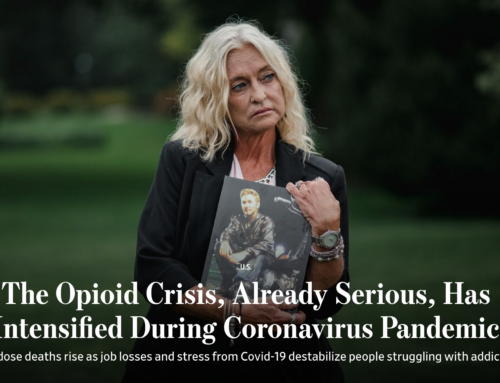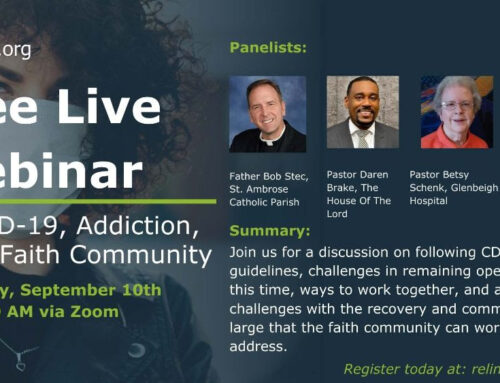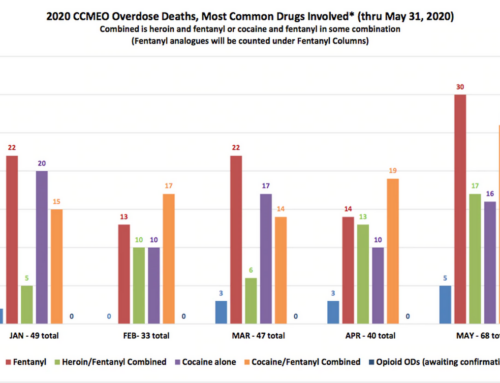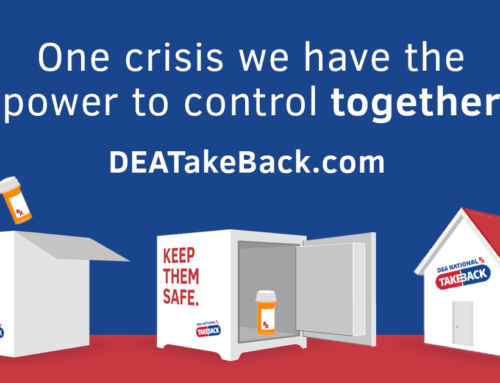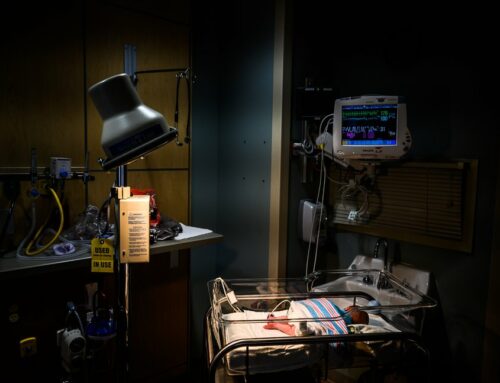ALBUQUERQUE, N. M.— Joline Gutierrez Krueger was with her youngest son at the dentist when Devin, her oldest, called to remind her to buy cat litter. “Love you,” he said, before hanging up.
It was March 8, a day that would split her life into before and after. Ms. Krueger, 60 years old, was a single mother who rode the ups and downs of raising six children yet had much to be grateful for: a house, a family and a career as a columnist for New Mexico’s largest newspaper.
About 45 minutes after Devin called, the phone rang again. Ms. Krueger’s 20-year-old son Nik was hyperventilating and struggling to speak through bursts of sobs. She could barely understand him, something about Devin and heroin. “No. That can’t be real,” she said. “Oh, god. Oh, god.’”
Ms. Krueger yanked her youngest from the dentist’s chair and sped her SUV toward home 30 miles away. She tried to reach Devin’s father, a medical technician working at nearby University of New Mexico Hospital. Nik called again to say Devin was already headed there in an ambulance.
She arrived at the emergency room, and Devin was in a coma. As Ms. Krueger clasped her son’s arm, Devin’s heart stopped. Nurses and doctors swarmed him. Ms. Krueger marveled at the medical staff’s choreographed focus before jolting back to the horror that it was her son they surrounded.
Devin’s heartbeat restarted, but his prospects were grim. A doctor said his brain was likely damaged from a lack of oxygen when he stopped breathing.
While Devin survived on life support and during the hazy hours that followed, Ms. Krueger pressed Nik and Devin’s friends for answers: How long had Devin been using heroin? Did they know about it?
Devin, a brawny 6-foot-4, 330 pounds, had seemed fine. At age 23, he drank, sure, and smoked pot, she said—but heroin? How could this have happened with a son living under her own roof, someone she saw every day?

Ms. Krueger had written about the drug’s grip on New Mexico, and the price paid by grieving families. She understood more than most the signs of heroin addiction and the consequences. She had told her children, over and over, Please, whatever you do, don’t go down that path.
“I was the educational mom,” Ms. Krueger said, sharing with her family what she learned as a reporter. She knew of stricter parents who had set rules and were convinced their children would never use hard drugs only to later discover hidden addictions.
In the end, she fared no better. “My mom radar was obviously pretty screwed up,” she said.
Even parents who do their best to know their children and guide them into adulthood seldom find the passage simple or easy. Sometimes it is painful.
This account is based on interviews with family and friends, as well as medical reports and court records.
Ground zero
Long before the tide of opioid addiction overtook the blue-collar towns of New England and the Rust Belt, New Mexico had already suffered.
Drug-Death Migration
New Mexico had the highest rate of drug overdose deaths in the U.S. during the first part of the 21st century, until it was surpassed by states hard hit by the opioid crisis.
Some public health experts trace the state’s first uptick in heroin use to the late-1970s, among Vietnam veterans who returned home to the rural hamlets of Northern New Mexico, as well as the Albuquerque region’s South Valley, both deep-rooted Hispanic communities.
New Mexico’s perch on the U.S.-Mexico border made it a destination for drug couriers ferrying black-tar heroin—named for its appearance—from the poppy fields in the Mexican state of Chihuahua.
In 1999, New Mexico had the highest rate of drug overdose deaths in the U.S., a grim distinction it held for all but one year until West Virginia took the top spot in 2010, according to the Centers for Disease Control and Prevention and state data.
In 2010, Ms. Krueger wrote a column for the Albuquerque Journal about a recent graduate of Eldorado High School who got hooked smoking heroin and died. Two years later, she wrote about the 16 year-old daughter of a restaurateur, who developed a heroin habit. It killed her, too.
Ms. Krueger wrote about the 22-year-old woman who overdosed on her grandparents’ floor shortly after getting out of the city jail; and the high-school wrestler who became addicted to pain pills after a sports injury his sophomore year. He switched to heroin, and his mother found him dead in his room.


As the drug traveled from the ramshackle adobe houses of the South Valley to middle- and upper-class neighborhoods in the city’s foothills, Ms. Krueger pleaded with her children: “Please promise me, you’ll never try heroin.”
She talked about her columns with Devin, filling in the gruesome details she had left out of the newspaper.
“He just would roll his eyes and say, ‘Mom, don’t worry. Heroin scares me. That is one thing I’m not going to try. I don’t like needles,’” she recalled him saying. Ms. Krueger believed him, just as she always had.
Parenthood
For five years around the time Devin was born in 1993, Ms. Krueger wrote about her life as a parent in a weekly newspaper column called “The Mother Load.” She had been an editor for the now-defunct Albuquerque Tribune before beginning the column, which documented such milestones as the day Devin first stood and his first trip to the state fair.
“I heard that word I had waited for for so long. ‘Mama’…My baby son knew me by name,” she wrote about a year after he was born.
Ms. Krueger, who had written stories about the state’s overburdened child welfare department, felt a special empathy for abandoned children. Beginning when Devin was 2 years old, she and her then-husband Mike Glenn started taking in foster children, eventually adopting five of them. Donald, David and Chris came from troubled families, Ms. Krueger said; Nik and Alicia’s birth mothers had been addicted to crack cocaine.
“Devin could have been this only child, but he now shared his life with five other kids,” she said. “It was a lot, but he was great about it.”

The family house, a rustic one-story off a twisting mountain road above Albuquerque, was usually hectic. There were rides to and from school and Saturdays crammed with youth soccer games and swim meets. During spring break, the family would head to the Gulf Coast for beach vacations.
The tumult of raising six children, including two with special needs, strained the marriage. Donald and David each had intellectual disabilities, and Nik also exhibited behavioral problems that Ms. Krueger chalked up to the crack habit of his birth mother. In 2004, with their children 11 years old and younger, the couple divorced, leaving Ms. Krueger to juggle work and family.
She stayed on good terms with her ex-husband, who remarried and lived nearby, sometimes taking the children to his house several times a month. Yet, she said, she often felt overwhelmed.
Ms. Krueger joined a support group of foster mothers, who jokingly called themselves the “Insane Mom Posse,” after a hip-hop duo. She bought how-to-parent books, hoping to mine any nugget of child-rearing advice.
Wild streak
Devin didn’t have his brothers’ developmental problems. But he suffered his share of bullying in elementary school over a temporary condition called encopresis, which causes children to occasionally lose control of their bowels.
By high school, Devin grew more confident, and Ms. Krueger relied on him to care for his siblings when she worked late. He took his brothers hiking in the mountains and taught them the fantasy game “Dungeons & Dragons.”
He was interested in chemistry, but his grades fell by the end of his sophomore year. Devin turned from schoolwork and smoked pot with friends, gravitating to a crew of social outcasts and sometimes wearing Goth makeup.
Ms. Krueger was thrilled her son now had friends but lectured him on ways marijuana hampered brain development. She didn’t allow any smoking at home, she said, and would occasionally search her children’s rooms.
By the 11th grade, after many parent-teacher meetings and arguments at home, Devin quit school. He planned to get a GED certificate and travel.
“I was really mad,” Ms. Krueger said. “But short of handcuffing him, there was nothing I could do with such a stubborn kid.”



Devin moved to Taos, N.M., where he lived and worked on a goat farm. He and friends traveled the West in an RV, busking for money. He learned to brew beer. Ms. Krueger said she saw the same restiveness she recognized from her own youth. A family friend, Laura Martinez, said, “She believed he would turn out fine, as she had.”
Devin’s father was worried. His son seemed depressed and edgy when he stopped by, and he drank too much, Mike Glenn said. Devin would storm off when he tried to speak with him about it.
Yet, there were also promising signs. Devin talked about taking classes at a community college to qualify for admission to the University of New Mexico.
Ms. Krueger helped him get a $4,000-a-month job with the state as a caretaker for Donald and David, his younger brothers with special needs. The pay allowed Devin to contribute $500 for rent while living at home.
Devin cut down on his drinking and began working out after a doctor warned him that an exam revealed signs of a fatty liver. He also was forging a new relationship with a young woman in Texas whom he had met online.
Ms. Krueger said Devin was the only one of her children she could talk to about her day, usually in the evenings over craft beers on the porch.
It was Nik who kept Ms. Krueger up at night. By the 10th grade, he also had dropped out of school. Nik got work as a janitor and a dishwasher at Ruth’s Chris Steakhouse. The baby-faced teen had a temper, usually directed at his mother—and sometimes at Devin.
Finding shelter
One night about a year ago, Nik came home late and saw a light in his big brother’s room. He nudged open the door. Devin’s hulking frame was stooped over, one hand clutching a syringe. Nik’s heart sank.
Devin had always been Nik’s protector and confidant. He had introduced Nik to hiking, the best videogames, the Wu-Tang Clan and Louis Armstrong. He was the only one in the family with whom Nik shared his thoughts.
“Are you crazy?” said Nik, a slight 5-foot-5 teen, to Devin, a towering, bearded 300-plus pounds, gripping the syringe filled with black liquid.

Devin confided in him that he was deeply unhappy and cared little about where his life was headed. His online relationship wasn’t going well, Nik said, leaving Devin, long past his teens, still without his first romantic partner. Devin said heroin helped him get over the setback, and that he knew his limits.
Unable to watch his brother stick the needle in his arm, Nik left the room.
Nik agonized whether to tell their mother. Devin had been the one to leap to his defense after Ms. Krueger had threatened to kick Nik out of the house for smashing a door in anger. Another time, Nik called the police on Devin after an argument turned physical. Devin spent the night in jail. Ms. Krueger was furious at Nik, but Devin forgave him.
If Nik revealed Devin’s secret, his mother probably wouldn’t believe it, coming from the son who couldn’t seem to steer clear of trouble. As long as he could remember, Nik said, Ms. Krueger could see no wrong in Devin.
Nik said he decided to just keep a close watch on his brother. From what he saw, Devin sometimes went weeks without using heroin and didn’t seem to suffer from the withdrawal. But when Devin was on heroin, he used a lot, Nik said, pumping the drug in his arm and drifting into unconsciousness.
Death by Drugs
Nik was overwhelmed by the burden and felt rudderless in his own life. One night in January, he was playing videogames with Devin and impulsively asked if he could try smoking heroin. Devin passed a black globule of the drug and, along with a friend there, showed Nik how to put it on a strip of aluminum foil and heat it with a lighter, inhaling the fumes through a straw.
He soon joined Devin, injecting the drug. Sometimes the brothers used heroin with Devin’s friends. One described the drug like an overpass—shelter from a rainstorm raging around them. After awhile, Nik said, he agreed.
By February, Devin’s friends began having to revive him with the overdose-reversal drug Naloxone, spraying the solution up his nose when Devin was unresponsive. Heroin and other opioids can slow the respiratory system to a standstill, causing death or a coma. Naloxone, which blocks the effect, is sold at pharmacies in New Mexico, typically under the brand name Narcan.
Nik recalled a time when Devin, high on heroin, sat listless outside a friend’s house, an unlit cigarette sagging from his mouth. When the friend couldn’t wake him, he squirted Narcan in Devin’s nose. After that, he gave Nik five doses of the antidote to keep handy.
“What if mom has to bury you?” Nik recalled asking his brother.
“She’s probably going to,” Devin said.
Last needle
Early March 8, Nik was in his room crying over a breakup. Devin came in and threw a giant arm around his brother to console him. They decided to play videogames, Nik said, but first Devin wanted a shot of heroin. Minutes later, Nik went into Devin’s room and saw his brother slumped on the bed.
Nik tried to rouse him. He reached into his pocket for a dose of Narcan and shoved the medication up Devin’s nose. His brother let out a gasp, then fell still again. “Devin, wake up!” Nik shouted. “WAKE UP!”
Nik ran to the phone in the kitchen and called 911. The dispatcher told him to try CPR while an ambulance was on its way. Nik got his brother Donald to help haul Devin off the bed. Donald, 20, was crying. As Nik tried to resuscitate his brother, Devin vomited. The ambulance arrived minutes later.

At the hospital, friends and family crowded into Devin’s room. Nik felt their eyes on him. “You guys all knew this and nobody told me?” Ms. Krueger said. Nik curled into a ball of grief and guilt on the floor.
A doctor told Ms. Krueger that tests showed Devin’s brain was so damaged that even if he regained consciousness, he would remain in a vegetative state.
The medical staff needed Ms. Krueger and her ex-husband to decide what to do next. They chose to remove Devin from life support that night. He died not long after—about six hours from the moment he put the last needle in his arm.
At home, Ms. Krueger scrolled through Devin’s cellphone and found his text messages with the woman who had sold him heroin. She picked through the clutter in his room, where Nik dug out a knapsack filled with syringes.
Recollections pieced together a disturbing pattern, Ms. Krueger said, clues too late to help: Devin switching to long-sleeve, button-down shirts that hid his arms. Paychecks that quickly disappeared. Requests to borrow money.
She also remembered times when Devin would call to ask when she would be home. “Devin was very good at hiding the fact that while he was high, I never saw him,” she said.
Nik blurted out what he knew, telling his mother that he feared she would never believe him. She told him he was probably right.
In a column about her grief, Ms. Krueger wrote: “I had missed every sign, a failure of my motherhood, an egregious violation of the natural order of things that I should be alive while he is dead.”
Ms. Krueger opened her house to Devin’s friends, who began sleeping in Devin’s old room, leaving behind their empty beer cans and ragtag belongings. Their presence brought comfort, Ms. Krueger said. Maybe she could help straighten up their lives after having failed to safeguard her son.

Nik blamed himself for not speaking up earlier. Ms. Krueger assured him that he couldn’t have saved his brother. She tried to get him into therapy.
One night in June, Nik cut himself with a kitchen knife, and Ms. Krueger called the police. Nik was committed to a mental-health facility for a week. After returning home, Nik said he felt better. He tried to take on more of Devin’s role, helping ferry Donald and David to school and to appointments.
Nik didn’t tell his mother that he had kept using heroin for several months after his brother died. He lied to her when she found needles in an empty beer bottle. Nik said he has since quit the drug.
On some days, Ms. Krueger parks outside a small beige house that Nik had showed her. Devin used to buy heroin there. She watches for anyone going in or out. She imagines knocking on the door and confronting whoever answers: Do you remember selling to a young man named Devin? He was my son. And the stuff you sold killed him. Did you know that?
After sitting in her car a while, she instead drives home.
—Adya Beasley contributed to this article.

ORIGINAL ARTICLE: https://www.wsj.com/articles/the-mother-who-knew-everything-and-saw-nothing-1512748998

